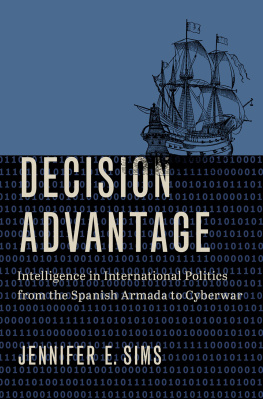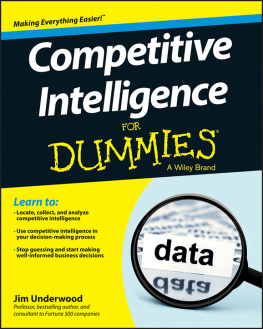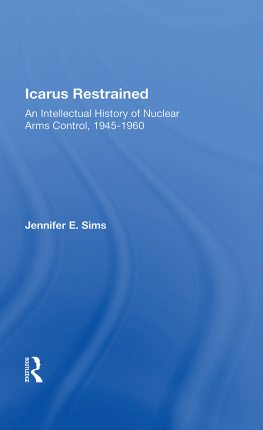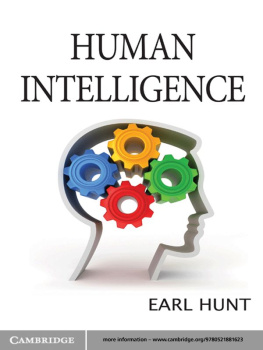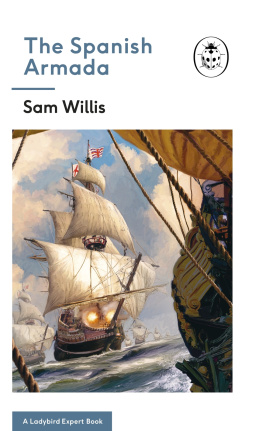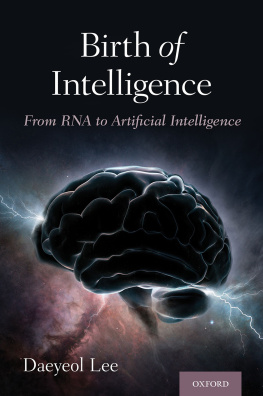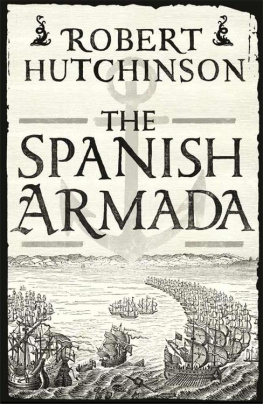Decision Advantage

Oxford University Press is a department of the University of Oxford. It furthers the Universitys objective of excellence in research, scholarship, and education by publishing worldwide. Oxford is a registered trade mark of Oxford University Press in the UK and certain other countries.
Published in the United States of America by Oxford University Press
198 Madison Avenue, New York, NY 10016, United States of America.
Oxford University Press 2022
All rights reserved. No part of this publication may be reproduced, stored in a retrieval system, or transmitted, in any form or by any means, without the prior permission in writing of Oxford University Press, or as expressly permitted by law, by license, or under terms agreed with the appropriate reproduction rights organization. Inquiries concerning reproduction outside the scope of the above should be sent to the Rights Department, Oxford University Press, at the address above.
You must not circulate this work in any other form and you must impose this same condition on any acquirer.
Library of Congress Cataloging-in-Publication Data
Names: Sims, Jennifer E., author.
Title: Decision advantage : intelligence in international politics from the
Spanish Armada to cyberwar / Jennifer E. Sims.
Description: New York, NY : Oxford University Press, 2022. |
Includes bibliographical references and index.
Identifiers: LCCN 2021031278 (print) | LCCN 2021031279 (ebook) |
ISBN 9780197508046 (hardback) | ISBN 9780197508060 (epub)
Subjects: LCSH: International relationsDecision making. |
Strategic planning. | Intelligence service. | Military intelligence.
Classification: LCC JZ1253 .S56 2022 (print) |
LCC JZ1253 (ebook) | DDC 327.12dc23
LC record available at https://lccn.loc.gov/2021031278
LC ebook record available at https://lccn.loc.gov/2021031279
DOI: 10.1093/oso/9780197508046.001.0001
For my husband, Bob Gallucci
Contents
It is, then, with perhaps unwarranted courage that I, a political scientist, have mined history for knowledge about intelligence, the worlds second oldest profession. Historians such as Howard tend to dislike this sort of thingand rightly sobecause mistakes can damage the historical record for years.
If I beg to differ with their wisdom in this case, it is because the language of intelligence is not well understood within academia. Of course, scholars have grappled with the impact of intelligence organizations and programs on international politics. But few have dedicated themselves to establishing that common language or theory which might unlock lessons about what intelligence has always been, let alone why it has succeeded, failed, and perpetuated itself over millennia. This volume represents an effort to provide that language and to suggest its significance for our understanding of politics and history. In so doing, I derive lessons that might help us deal with the modern information revolution, including cyberwar, artificial intelligence, and mass deception operations.
The challenge, though enormous, has seemed worthwhile and feasible. One reason is that historians have developed substantial records of significant historical events, such as the Spanish Armada, the US Civil War, and the diplomacy before World Wars I and II. Without the rigorous methods of historical research, we would be left to cherry-pick stories or anecdotes rather than see and understand competitive learning contextualized within the larger flow of politics, diplomacy, and war. Given good historical records, political scientists have an important role. Without the rudiments of theory, we would be swimming in a morass of detail, or we would be waylaid by the discovery of secret triumphs irrelevant to historical outcomes. It has only been in recent decades that political scientists and historians have become interested in intelligence as a jointly pursued aspect of their respective disciplines. To this exceptional generation of scholars, including David Dilks, Mark Lowenthal, Ernest May, Robert Jervis, Richard Betts, Christopher Andrew, Geoffrey Parker, and others, we owe an enormous debt of gratitude. They have pressed reluctant governments to declassify historical documents and, thereby, have helped us all to learn from history.
Methodological differences have, however, sometimes become obstacles to joint study and better learning about intelligence. Without good theory, which political scientists have only belatedly begun to supply, researchers suffer from biases and so come to erroneous conclusions about the impact of intelligence on outcomes. For their part, historians often seem averse to theory, fearing it prejudices their work.
All of us, including scholars, entertain theories. Theory is, at its simplest, just a set of rules for sifting material, organizing it, and presenting it for edification. For example, writing a history of WWI employs theory if only to say that this cataclysmic event can be separated from the wars of German reunification and from WWII as a discrete event with its own causes, beginnings, and endings. One might as easily say that the two world wars are better understood as part of one particularly violent period in a more general European adjustment to the industrial revolution. If how one carves up history involves theory of some kind, then most historians and political scientists engage in theorizing at least at some level. The difference really is that political scientists put their selection rules up front and make their conclusions about cause and effect explicit. The inevitable lack of nuance in such work makes historians understandably uncomfortable. Political scientists theorize, however, so that the reader can follow their logic. They prefer to make their selection criteria rigorous and test those rules and theoretical propositions against historical evidence, even if doing so risks overgeneralization and a certain tone-deafness to the periods involved. Such approaches can have tragic outcomes if the work skips too lightly over the history, sowing distrust in the results, or makes too much of otherwise inconsequential historical data just because they can be counted. Historians know that, rich as the human past is, one can find evidence for almost any idea, weaving narratives, including outlandish ones, in support of it. What distinguishes storytellers and conspiracy theorists from political scientists is rigor: the latter invite challenges to their work from peers armed with facts and counterevidence.
It is with all these notions in mind that I have written a book theorizing about the phenomenon we call intelligence and how it has shaped the course of winning and losing in international affairs. To do this work, I have defined intelligence not as what modern intelligence institutions do, but as competitive, purposeful learningan endeavor in which humankind has engaged since prehistoric times. The implicit claim is that intelligence springs from curiosity, is therefore integral to human affairs, and is an underappreciated form of power that helps some humans to avoid predation and others to accomplish it. Intelligence is therefore best understood as a tool shaped to competitive purposes. And, since the best judge of its success is the decision-maker who wields it, intelligence serves less some elusive truth or prediction than that decision-makers advantage as he seeks to protect himself or his group from an observant and reactive foe.

